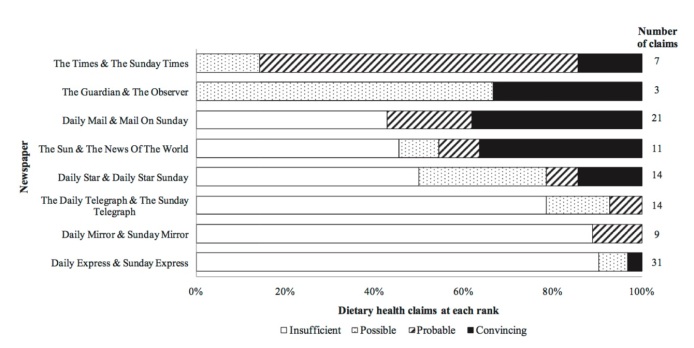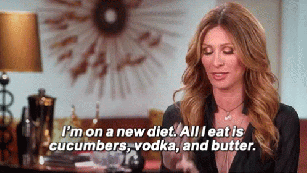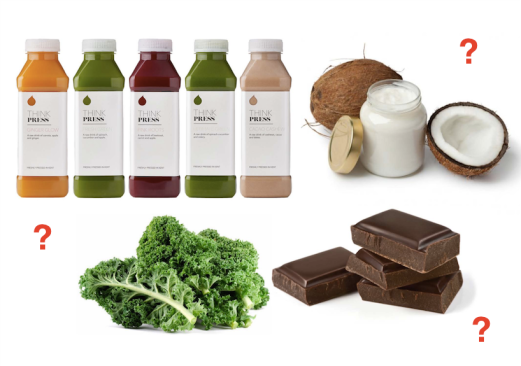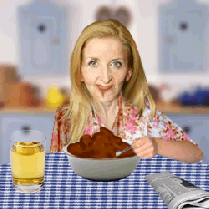
Bombarded by a vast array of articles, often directly contradictory, it can become almost impossible to decipher what is fact and what is fiction when it comes to nutritional advice. 61.7% of adults in the UK are now classified as overweight or obese 1 and there has never been a time when public health considerations are of a greater paramount importance. Acting as an essential source of information to the public on matters regarding health and nutrition 2 the media can often oversimplify, sensationalise and report on weak and groundless claims 3. A study of UK newspapers concluded that the majority of nutritional claims had “no credible scientific basis” 4, with the results shown in figure 1 4.

fig. 1
The “Sauce” of the problem
It is important to understand that much of this miscommunication comes from the institutional role and agendas of the media. Scientists must follow a stringent series of events when obtaining scientific knowledge known as the scientific method, promoting an objective view of their research. However, journalists are not governed by these same principles and reporting is often determined by the media’s agenda involving; “novelty, controversy and public interest” 4 ultimately needing to sell papers. Now it becomes easy to see how sensational headlines and stories backed by limited evidence arise and it is essential that you understand that the media’s personal agenda may impact the objectivity and accuracy of the stories you read. As well as this it is important to appreciate the media does have to simplify stories making them accessible to the lay public. However, this does not justify the often gross misreporting has resulted in a public mistrust of nutritional science. A survey by the World Cancer Research Foundation in 2009 revealed that 52% of UK residents felt scientists were “always changing their mind” and as a result, 27% felt we should totally ignore dietary reporting 4.
Tabloids have gained extensive popularity across the UK. The Daily Mail and The Sun respectively have the greatest net readership 5 in the UK. Tabloids often favour drama and entertainment in place of accuracy. Two headlines from The Daily Mail are shown below.
 fig.2
fig.2

fig.3
MIXED MESSAGE MUCH?

Case Study
In July 2014, the popular British tabloid the Daily Mail posted an article which, in its bold headline (fig. 2), suggested that coffee among other things was a potential cause of cancer. The article itself fails to provide a proper background into the research undertaken on the chemical found in coffee, which some scientists argue might have carcinogenic properties. The sensationalist headline was certainly enough to install a sense of fear into the reader about the drinking of coffee.
And yet just two years later, in June 2016, the Daily Mail released another article on coffee and its relationship with cancer (fig. 3). In a miraculous change of tone, the tabloid proceeded to argue in the new article about the benefits of drinking coffee, boasting the headline: “Coffee could keep cancer at bay”. Again the article itself still provides little scientific evidence to actually back up the bold claim. The reality is that, in the space of two years, the effect of coffee and its risks with regard to cancer cannot have just shifted so dramatically from a negative to positive light.
Clearly there is some misinterpretation by The Daily Mail of the research done into coffee. Unfortunately this is intentionally done by the tabloids who feel the need to attribute a single cause to a more complex issue 6. Neither headline is an outright lie, no doubt there might be some research which suggests that coffee has a role to play in increasing the risk of some forms of cancers and reducing the risk in others, but the nature of the claims made by the tabloids are fundamentally an exaggeration of the research.
Playing off of the relative public ignorance with regard to the nature and mechanisms of cancers, sensationalist headlines can scaremonger the public by simply mentioning the word cancer to play on readers emotions, thus ill-informing them about what they should and should not consume based on tenuous and misrepresented research.
For your own interest or amusement here is a list of factors that The Daily Mail has said to either cause or prevent cancer. Funnily enough most items seem to feature on both sides of the list!!!
How to spot the signs?
So…It’s no good just knowing that there is sensationalism in food stories. You need to know how to be able to identify the signs which tell a good piece of health information from the bad. In this way we can all enjoy the entertainment that a tabloid or magazine can give, but know what to watch out for to help avoid the utter confusion we seem to be facing regarding nutrition.

Language
- Most tabloids and magazines will use sensationalist language 7. Remember that bold statements are intended to shock, hold relevance and so appeal to the public. We all like information to be simple and easy to understand, however, watch out, the ‘science’ is often oversimplified and likely to be contradicted.

fig 4
-
“Ignore any article that suggests a single food confers either miraculous or devastating health effects” 7.
fig. 5

Well, as much as we hope this is true, here it is clear to see that this headline makes a broad and vague statement. It suggests that cheese might have these so called miraculous effects, but at the same time the claim is almost unarguable and impossible to disprove. I mean how long is a long life, 70, 80, 90?
- Remember one recommendation will not work for everyone 8. Drinking juice everyday might work amazingly for one person, but it might not for another. It is always best to follow the advice of a medical practitioner. If you have a question, research it.

- Have you seen trends starting to arise? Are you starting to see an over publication of a particular food or diet in the media? Big industry controls much of what gets published in the headlines 9. so you should expect, Juice cleanses, Avocados, Asparagus water (yes Asparagus water) to dominate news stories and then… disappear.


- “It’s an Avocado! Thanks.”
Source
- Authors and journalists tend to get their information from press releases quickly and do not have the time or count to criticise the methodology of the science 7.
- So, look into the true source of your information: Is it research published from a university? A organisation with vested interests 10? It’s always best to think of the intentions of the information sources.
- Universities often need publicity and funding for further research. However, many studies do have good intentions, but are not conclusive in their findings. Authors in turn try and reach strong conclusions to appeal to the reader.
Author
- Journalists the majority of the time act as a filter between the science and the ‘public’. As a result we are often listening to manipulated information 7.
- If you have the time read up on the health columnist that wrote the article. They may not have the credentials they say, and so are they truly informed to make strong claims which have a strong influence? Here I want to use:
The case of ‘The Gillian’.
Gillian McKeith is certainly a bit of a character, not only do we know her for her fainting session on I’m a Celebrity, but she somehow forged a career as a ‘Doctor’, author, columnist and TV regular, famous for smelling human excrement for more than a decade as a genuine form of prognosis 11. I don’t really want to question her method much… However, it is important to see how our judgement can become clouded by a deceleration of scientific authority. Dr Gillian, recently became – Gillian as it turned out she bought her PhD. Dr. Ben Goldacre commented that she ‘seems to misunderstand not nuances, but the most basic aspects of biology’ 11. So, it seems a little worrying that some authors can hold a lot of influence in the press whilst not having a proper scientific background.

Sorry Gill.
Compound Interest have created a great guideline for spotting ‘bad science’ in the media, which is very applicable to food and nutrition claims in the tabloids too.
 fig. 6
fig. 6
Also, If you have an extra 20 minutes to spare, whilst riding on the tube, walking your dog etc. check out this podcast titled, ‘A Skeptic’s Guide to Health News and Diet Fads’ 12. It cracks down on the issue of miscommunication of diet news in the media well, (even if it is from an American perspective) and is a good extra if you want to brush up even more on the topic.
So…
 Haha, you wish.
Haha, you wish.
The surge of online sources that lack credible expert opinion has actually perpetuated the problem in finding accurate and trustworthy health information.
It is therefore essential that you take a critical approach to reading health claims and use the red flags that we previously highlighted to spot sensational and unfounded claims.
Where to turn?
Now with your new ability to spot these sensational and unfounded claims, you may be asking yourself where do I turn to find reliable and scientifically backed nutritional advice?

We’re glad. We do too Hillary.
There are many organizations where you can easily find impartial advice where the authors are not bound by the same agendas as tabloid journalists.
Here is a list of websites we recommend you visit if you have any nutritional concerns:
National Health Services offers the service NHS choices where you can obtain up to date and achievable health recommendations. These national guidelines provide relevant lifestyle choices and has a health news tab where you can find current research aimed at informing the public
http://www.nhs.uk/Livewell/Pages/Livewellhub.aspx\
The World Health Organization (WHO) offers a nutrition page amongst an extensive array of health guidance. Here the information is presented in an informative manner. Specific scientific data can be found on the fact sheet links.
http://www.who.int/topics/nutrition/en/
With 3.5 million now diagnosed with diabetes in the UK it feels important to provide you with specific advice on this disease. Type 2 diabetes is largely attributed to lifestyle choices (nutrition being a major factor) and Diabetes UK a comprehensive guide to managing your diet.
These organization’s aims are specifically to inform the public and are not motivated by news values that govern tabloid journalists.
We do appreciate that tabloids can provide entertainment and spark interest in health topics. Our key point is that you take these health claims with a “pinch of salt” (Eyy) and try to be as critical as possible when evaluating how they impact your life.
Word count: 1,457
References
- UK and Ireland prevalence and trends :: Public Health England Obesity Knowledge and Intelligence team. (n.d.). Retrieved December 09, 2016, from https://www.noo.org.uk/NOO_about_obesity/adult_obesity/UK_prevalence_and_trends
- Fernández-Celemín, L., & Jung, A. (2006). What should be the role of the media in nutrition communication? British Journal of Nutrition, 96(S1). doi:10.1079/bjn20061707
- Deciphering Media Stories on Diet. (2016). Retrieved December 09, 2016, from https://www.hsph.harvard.edu/nutritionsource/media/
- Benjamin E. J. Cooper, William E. Lee, Ben M. Goldacre and Thomas A. B. Sanders (2012). The quality of the evidence for dietary advice given in UK national newspapers. Retrieved December 09, 2016, from http://pus.sagepub.com/lookup/doi/10.1177/0963662511401782
- UK Top selling newspapers 2016 | Statista. (n.d.). Retrieved December 09, 2016, from https://www.statista.com/statistics/246077/reach-of-selected-national-newspapers-in-the-uk/
- Choices, N. (2016, January 6). How to read health news. Retrieved December 11, 2016, from http://www.nhs.uk/news/Pages/Howtoreadarticlesabouthealthandhealthcare.aspx
- Freedhoff, Y. (2012, August 22). Sensational Nutrition Headlines: Ignore Them. Retrieved December 7, 2016, from http://health.usnews.com/health-news/blogs/eat-run/2012/08/22/sensational-nutrition-headlines-ignore-them
- Tupper, N. (2012, July 16). 10 Ways to Identify a Fad Diet. Retrieved December 9, 2016, from https://www.caloriesecrets.net/10-ways-to-identify-a-fad-diet/
- Johnson, N. (2013, July/August). Food Confusion. Retrieved from https://alumni.stanford.edu/get/page/magazine/article/?article_id=63169
- Scott, C. (2015, May 01). Yes, No, Maybe: Why Is Nutrition Advice So Confusing? Retrieved from http://www.healthline.com/health-news/why-is-nutrition-advice-so-confusing-050115#1
- Goldacre, B. (2007, February 18). What’s wrong with Dr Gillian McKeith PhD? – Bad Science. Retrieved from http://www.badscience.net/2007/02/ms-gillian-mckeith-banned-from-calling-herself-a-doctor/
- Gladstone, B. (producer), Bohannon, J., Schwitzer, G., & Caulfield, T. (2015, July 31). A Skeptic’s Guide to Health News and Diet Fads [Audio podcast]. Retrieved from http://www.wnyc.org/story/skeptics-guide-health-news-and-diet-fads/
Fig. 1 Benjamin E. J. Cooper, William E. Lee, Ben M. Goldacre and Thomas A. B. Sanders (2012). The quality of the evidence for dietary advice given in UK national newspapers. Retrieved December 09, 2016, from http://pus.sagepub.com/lookup/doi/10.1177/0963662511401782
Fig. 2 Poulter, S. (2014, July 3). Chemical found in coffee, chips and crisps is a cancer risk: Watchdog wants new controls on substance that forms when food is roasted, fried or browned. The Daily Mail. Retrieved December 11, 2016, from http://www.dailymail.co.uk/news/article-2678663/Chemical-coffee-chips-crisps-cancer-risk-Watchdog-wants-new-controls-substance-forms-food-roasted-fried-browned.html
Fig. 3 Wright, S. (2016, June 14). Coffee could keep cancer at bay: Consuming drink regularly may prevent certain types of disease such as womb and liver cancer. The Daily Mail. Retrieved December 11, 2016, from http://www.dailymail.co.uk/news/article-3641896/Health-chiefs-tell-coffee-cancer-bay-Consuming-drink-regularly-prevent-certain-types-disease-womb-liver-cancer.
Fig. 4 Time Magazine. 1984-2014 [Digital image]. (n.d.). Retrieved from http://vaccination.co.uk/wp-content/uploads/3b47320fc39c8f374b9102dec11adbe9.jpg
Fig. 5 Parker, S. (2016, November 23). Eating cheese could be the secret to a long life. Retrieved December 9, 2016, from http://www.cosmopolitan.co.uk/body/health/news/a47537/eating-cheese-linked-to-long-life/
Fig. 6 A Rough Guide to Spotting ‘Bad Science’ [Digital image]. (2014). Retrieved from http://www.compoundchem.com/2014/04/02/a-rough-guide-to-spotting-bad-science/


Hi,
Your blog has a really clean and captivating layout, with excellent picture and gif use. Although potentially a little over enthusiastic on that front! We really like your pun!
We think in places in the bulk the language is a bit clinical, and difficult to follow. It could be broken up a bit more, maybe in a similar way to the section on how to spot bad articles.That section is really engaging, its broken down in to bitesize chunks and is easy to read.
Overall it’s a really good piece, engaging, and largely easy to follow.
🙂
LikeLiked by 1 person
We thought your blog had a very inviting home page and a good aesthetic for the whole website. However, one aspect of the design we thought could be improved was the use of images. We felt they could be better integrated with the text and some were perhaps less relevant and therefore not necessary.
The use of bold writing to highlight the key point in the first paragraph was excellent and the main title and some subheadings were particularly captivating. This could have been continued throughout the blog post to further improve the accessibility of the post.
The content of the post is well structured with a relevant and interesting case study but better linking of sections and the matching of writing styles would help to improve the flow of the post as it feels disjointed at times. Overall, the argument is convincing and is well supported by carefully chosen and easy to understand evidence as well as plenty of links for additional information.
LikeLike
Hi,
We think this is a great blog – the visual aspects that engage the reader are well-placed but could be thought to detract from the actual content as they are so frequent. Also, we like the questions posed, the ‘analysis’ of media headlines and how you have facilitated the possibility of finding out more should a reader wish to do so. Good job!
Group 6
LikeLiked by 1 person